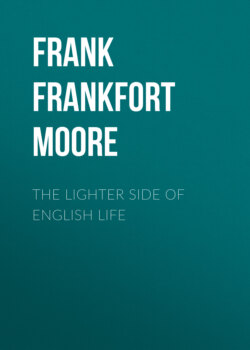Читать книгу The Lighter Side of English Life - Frank Frankfort Moore - Страница 13
На сайте Литреса книга снята с продажи.
I.—THE GENERAL
ОглавлениеTable of Contents
ON A VERY DIFFERENT PLANE OF INterest I regard my experience of two delightful old people whom I found living, the one a mile or two on the Brindlington side of Thurswell, the other on the Broadminster side, “where the Dean lives.” The former is an old general who once commanded a regiment of Sikhs and spent fifty years in India. He is now eighty-three years of age, and has two sons with the rank of colonel, a grandson who is a captain of Sappers, and two who are lieutenants in the navy. The old man has nothing of the bristling retired general about him—not even the liver. He is of a gentle, genial nature, not very anxious to hear the latest news, and not at all eager to make his visitors acquainted with his experiences in India or his views as to the exact degree of decadence reached by “the sarvice.” He speaks in a low and an almost apologetic tone, and is interested in old Oriental china and tortoiseshell tea-caddies. One could never believe that this was the man whose sobriquet of Shire-i-Iran (Lion of Persia) was once a household word along the turbulent northwest frontier, or that he had been the most brilliant exponent of all the dash which one associates with the cavalry leader. His reputation on that long frontier was that of an Oriental equivalent of the Wild Huntsman of the German ballad. People had visions of him galloping by night at the head of his splendid Sikhs to cut off the latest fanatical insurrectionary from his supports, and then sweep him and his marauders off the face of the earth. Certainly no cavalry leader ever handled his men with that daring which he displayed—a daring that would have deserved to be called recklessness had it once failed. … And there he sat at dinner, talking in his low voice about the fluted rim of one of his tea-caddies, and explaining how it was quite possible to repair the silver stringing that beautified the top. Once I fancied I overheard him telling the person who sat by him at dinner about the native regiments—I felt sure that I heard the word “Sepoy,” and I became alert. Alas! the word that I had caught was only “tea-poy”—he was telling how he had got a finely cut glass for a deficient caddie out of an old nineteenth-century mahogany tea-poy. That was the nearest approach he made to the days of his greatness.
But I noticed with satisfaction that he partook of every dish that was offered to him—down to the marmalade pudding. At dessert he glanced down the table and said that he thought he would have an apple. “No, dear,” said his daughter, gently but firmly removing the dish beyond his reach. “You know that you are not allowed to touch apples.”
“Why, what harm will an apple do me—just one—only one apple?” he inquired, and there were tears in his voice—it had become a tremulous pipe, the tone of a child whose treat had been unjustly curtailed. “No, dear, not even one. It is for your own good: you should have an apple if it agreed with you; but it doesn't.”
“I want an apple—I can't see what harm an apple would do me,” he cried again. But his daughter was firm. It was very pathetic to witness the scene. The Lion of Persia becoming plaintive at being denied a rosy-cheeked apple. The man who, with a force of only six hundred sabres behind him, had ridden up to Mir Ali Singh with the three thousand rebels supporting him, and demanded his sword, and got it, not being able to get his apple when he had asked for it nicely, seemed to me to be a most pathetic figure. I pleaded for him as one pleads for a child in the nursery: he had been a good boy and had eaten all that had been set before him quite nicely—why might he not have an apple to make him happy?
But the daughter was inexorable. She told me that I did not know her father, while she did. An apple would be poison to him; and so the old hero was left complaining, with an occasional falsetto note, upon the restrictions of his commissariat. I am pretty sure that there was no falsetto note in any of his complaints in regard to commissariat forty years ago.
He was a noble old warrior, however, for when his daughter had, with the rest of the ladies, left us after dinner, he never put out a hand to the apple dish, though there was no man at the table who would have interfered with him had he done so; the Newtown Pippins remained blushing, but not on account of any disloyalty on his part to the duty he owed to the daughter who had his welfare at heart.
